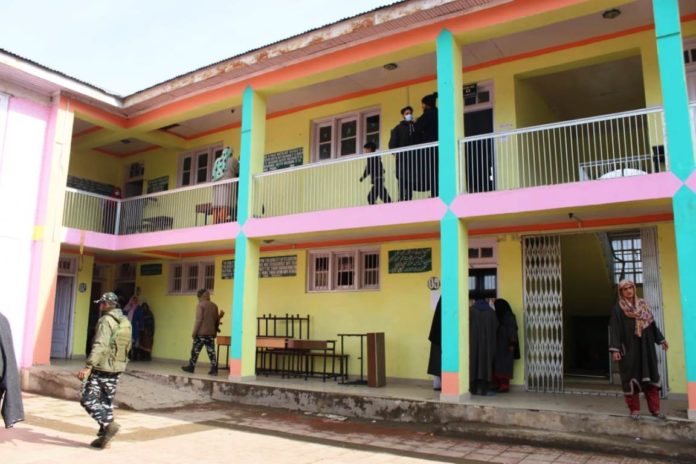SRINAGAR: Jammu and Kashmir’s Pir Panjal region witnessed an overwhelming response from first-time voters who enthusiastically participated in the second phase of assembly elections on Wednesday, aspiring for better job opportunities, skill education, development and good governance in the Union territory.
For them, it was not just a responsibility to exercise their right to vote but also a matter of great pride. A large number of such voters turned up at the booths, not only in urban but also in rural areas of Rajouri, Poonch, and Reasi districts.
The issues of restoration of statehood, Article 370, regional discrimination and sectarian politics failed to catch up with the young voters in J&K, as they want jobs, development, good governance, and peace.
Some returned to their native places from colleges and workplaces with a commitment to vote in their birthplaces across Rajouri, Poonch, and Reasi districts.
“I am very happy to vote for the first time in my life. It is my right and duty too. It makes me proud of my country that has given us the right to choose our representatives. I urge all youngsters to come out and vote to choose your government,” said 21-year-old Ananya, an engineering student, who came from Jammu to Rajouri for voting.
Ananya, who cast her vote at Chatyar model polling station, emphasized the need for a government that would ensure not only peace and normalcy but also jobs for the youth, skill education, and development.
“The basic demand of youngsters is to secure jobs after completing their degrees. As the education system shifts towards skill development, it is crucial that education focuses on equipping youth with practical skills,” she added.
At a booth in Muradpur mountainous area of Rajouri district, many voters captured the memory of getting their index fingers inked for the first time at selfie points set up at the booth. Beyond participating in democracy’s biggest celebration, these new voters unanimously demanded better education and governance.
“Getting your finger inked is a deeply satisfying experience. I cherish it. It also comes with a sense of responsibility. Voting is our right to choose our representatives and the government that will shape our future. We must perform this constitutional duty,” said Sarwar, another student.
“The youth are not concerned about politics. Our focus is on electing a government that prioritizes better education, healthcare, and job opportunities,” he added.
Divya Sharma, another first-timer at a model booth in Poonch, advocated for improvement in education, particularly in professional fields, and the establishment of a government medical college to produce doctors in Poonch.
“Voting is a significant exercise to decide our future because it is linked to forming a government that makes policies for young people,” she said.
Similarly, Tikshan Bali said she voted for development and good governance of Poonch. “I want the elected representatives to ensure better education, healthcare, communication infrastructure, tourism, and above all, job opportunities for youth.”
Anwar Hussain, an undergraduate student from Mahore in Reasi district, also voting for the first time, emphasized the need for improved education, healthcare, and road infrastructure in their region. “We need jobs and skill education,” he said.
Lakshmi Khajuria, who possesses a postgraduate degree from Pune University, had earlier considered it a futile exercise, believing her vote wouldn’t make a difference.
“But seeing the changes made by governments over the years, I felt I should contribute,” Khajuria, who voted at a polling station in Katra, said.
Before casting her vote, she thoroughly reviewed each party’s manifesto and candidates’ track records.
“Our Union territory has ample room for development…Katra faces numerous challenges and infrastructure needs to be upgraded to take care of pilgrims. I hope my vote will contribute to overall sustainable development and infrastructure improvement in the city and J&K,” she said.
In the second phase of elections in J&K, there are over 40,000 voters in the age group of 18 to 19.
Voting began at 7 am across the 26 assembly constituencies under tight security.
The second phase covers six districts — three in the Valley and three in the Jammu division.
In this phase, 93 candidates are contesting in Srinagar district, followed by 46 in Budgam district, 34 in Rajouri district, 25 in Poonch district, 21 in Ganderbal district, and 20 in Reasi district.
Key leaders whose fate will be determined in this phase include former chief minister Omar Abdullah, JKPCC president Tariq Hamid Karra, and J&K BJP chief Ravinder Raina.


